7 reasons why your dog may be panting and restless
Remember that dogs aren’t able to sweat to dissipate excess heat. Instead, they pant. Panting is the primary way that dogs regulate their body temperature—the steamy air from their lungs is replaced with colder air, and in that process, evaporative cooling occurs.
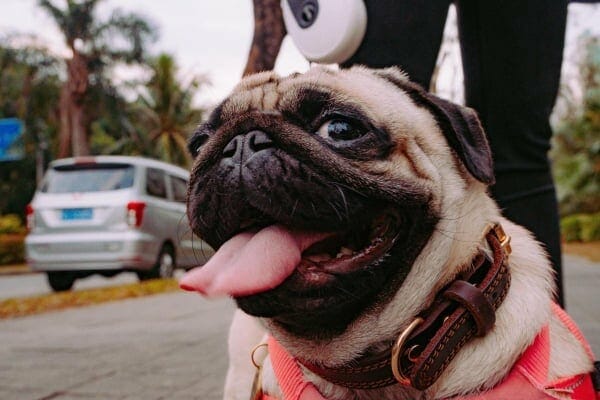
However, a dog who is panting, pacing, and restless may have something else going on. Let’s explore the seven most common reasons:
Excessive panting can be a symptom of problems with your dog’s primary organ system. You may also notice him coughing occasionally or breathing heavily after a casual walk or exercise.
The heart plays an extremely important role in delivering oxygen to the rest of the body. When that process is hindered, your dog’s heart can’t pump effectively which means his body doesn’t get the oxygen it needs to perform routine processes. Valve disorders, arrhythmias, cardiomyopathies, and heartworm disease in dogs are all examples of illnesses that can affect the heart’s ability to do its job properly.
Your veterinarian can often detect heart murmurs or arrhythmias just by listening to your dog’s chest. Just another reason regular check-ups are so important.
Respiratory disease makes it difficult for the body to get enough oxygen into the bloodstream as well as to remove waste products, such as carbon dioxide, from circulation.
Diseases like tracheal collapse and laryngeal paralysis often affect the respiratory tracts of senior dogs.
Like you and me, dogs experience anxiety and fear. Unpleasant sights and sounds act as triggers, and a dog’s response to these triggers can be pretty dramatic.
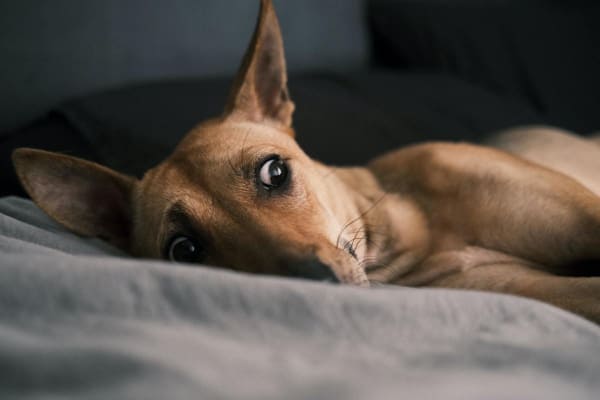
For example, sudden loud sounds such as fireworks cause many dogs to tuck tail, run, and look for a safe place to hide. Others may stay around but shake and tremble. Some dogs exhibit more subtle signs, including:
Anxiety and phobias can be difficult to treat without identifying the cause. Once the cause is identified, the next step is to reduce or eliminate it. In some cases, your veterinarian may recommend the use of prescription anti-anxiety medications or calming products such as pheromone diffusers or calming treats and diets. If you’ve ever lived through a thunderstorm with a dog who has T-storm (noise) phobia, you’ve witnessed firsthand that heavy panting can be a sign of stress and anxiety.
Canine cognitive dysfunction, or CCD, refers to the gradual onset of dementia-like signs in senior dogs due to changes within the brain. These changes affect a dog’s behavior, motor function, and memory, and can be associated with panting. CCD is most likely to occur in dogs who are more than ten years old. Sadly, dogs with CCD are often confused, have a disrupted sleep-wake cycle, and may seem to get ” lost” in their own homes.
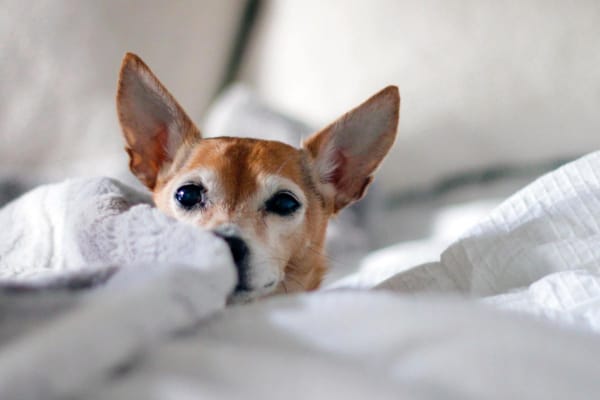
One of the most common signs of CCD is frequent pacing, especially during the night. Dubbed “sundowner syndrome,” the condition by the same name also occurs in senior humans. Other clinical signs include:
Although there is no cure for CCD, there are treatment options including medications, supplements, and strategies for behavior modification.
For more information about CCD in senior dogs, please see Managing Canine Cognitive Dysfunction: Signs, Symptoms, Solutions.
Dogs who are anemic don’t have enough red blood cells in their bloodstream. These dogs often pant and are restless because their internal organs aren’t getting enough oxygen and the brain is demanding more.
Anemia has many causes, including blood loss due to external or internal bleeding; illnesses such as hemolytic anemia, which occurs when red blood cells rupture after being attacked by the immune system; and diseases of the bone marrow, such as genetic illnesses or cancer, which cause fewer red blood cells to be produced.
Dogs with anemia tend to be lethargic and may lose their appetite and appear nauseous. If there’s internal bleeding, particularly in the abdomen, the dog will also be in pain—another cause of excessive panting.
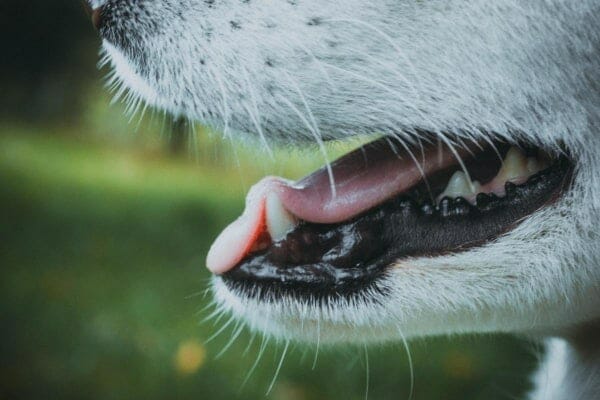
To confirm that your dog is anemic, your veterinarian will perform routine blood work and may also recommend special blood and urine tests, X-rays, and an ultrasound. Treatment will depend on the underlying cause. Antibiotics treat anemia caused by an infection, whereas a variety of medications treat immune-mediated anemias, including immunosuppressive drugs. If injury or hemorrhage is the cause of the anemia, your dog needs treatment right away—sometimes with emergency surgery. If the anemia is severe, your dog may also need a blood transfusion. A dog who has an elevated respiratory rate as a result of anemia will also have pale gums. Learn your dog’s normal baseline gum color by looking at his mucous membranes. I’ll show you how in my article: Keeping a Pulse on Your Dog’s Vital Signs.
Like humans, dogs have numerous glands that release hormones to send messages to other parts of the body. To help with the “fight or flight” response, the pituitary gland in the brain releases a hormone called adrenocorticotropic hormone (ACTH) that makes its way down to the adrenal glands. In response, the adrenals produce numerous substances, including cortisol, designed to help your dog deal with the perceived threat. Cortisol also has other important functions including the regulation of blood sugar levels and metabolism.
Too much cortisol in the bloodstream causes Cushing’s disease, a condition known as hyperadrenocorticism. It is most common in middle-aged and older dogs and another concerning reason why your dog may be panting and restless.
There are a few reasons a dog may develop Cushing’s disease. A tumor on the pituitary gland will cause an increase in the release of ACTH; thus, adrenals are constantly being signaled to release more cortisol. Tumors can also develop on the adrenal glands themselves, also resulting in excess cortisol release. Additionally, long-term use of an oral steroid such as prednisone can provoke Cushing’s, as this type of steroid mimics cortisol.
The most common clinical signs of Cushing’s disease are excessive panting, increased thirst and urination, increased appetite, and a pot-bellied appearance. Abnormalities on routine blood and urine testing can also be suggestive of Cushing’s, especially when clinical signs are present. Special blood tests, such as a low-dose dexamethasone suppression test (LDDST) or an ACTH stimulation test, may be recommended to help reach a more definitive diagnosis.
The treatment plan depends on the root cause of Cushing’s. Adrenal tumors may require surgery, while pituitary-dependent cases can show improvement with an oral medication like trilostane (brand name: Vetoryl). Cushing’s disease is very common among senior dogs, and excessive panting is one of the hallmarks of the disease.
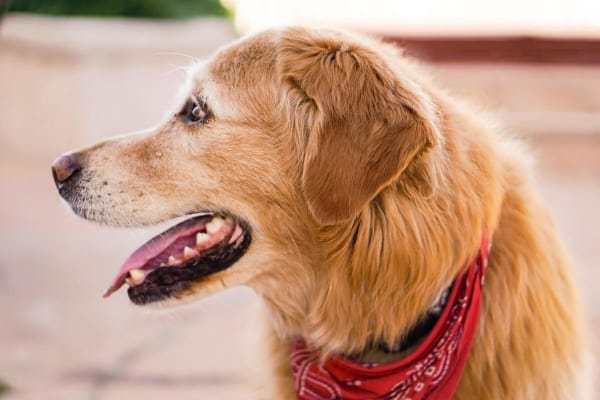
Arthritis, surgery, and injury are just a few of the causes of pain in dogs. Some signs are obvious (limping, for example), while others—panting, restlessness, and hiding—are more subtle. A dog who jumps down from a deck or porch, and then starts to limp is exhibiting a sign of acute (sudden onset) pain, while dogs with arthritis or old injuries can have chronic pain that affects them intermittently.
It’s important to know the signs of pain in dogs, and to seek help for your dog if you see them. Elevated heart rate and elevated respiratory rate (panting) are classic and objective measures of pain in dogs.
An important note: Don’t give your dog your own pain medications. Most are human non-steroidal anti-inflammatory drugs—NSAIDS—which are not safe for use with dogs.
If your dog is panting and restless, talk with your vet
Here’s the big takeaway on panting and restlessness in senior dogs: unless it’s transient and occasional, it’s not normal. The causes are numerous and varied, but all of them need to be addressed.
If you have questions, please ask your veterinarian. He or she is an integral part of your dog’s healthcare team and the perfect resource to help you unravel the mystery of why your dog is panting and restless.
A crucial note: If your dog is having trouble breathing, if his gum/tongue color is greyish or bluish instead of pink, or if his resting respiratory rate is greater than 60 breaths per minute, seek veterinary care immediately.
One acute condition which often presents with panting and restlessness and is a true, life-threatening emergency is gastric dilatation and volvulus (GDV) known more commonly as bloat. To learn more, see Bloat in Dogs: When Every Second Counts.
Pain or injury
See whether the dog has any pain conditions or injuries.
Dogs with pain conditions like arthritis are very vulnerable to panting and restlessness.
Allergies, too, can be a problem and cause dogs to pant at night.
If you can’t find any injuries, check whether any diseases mentioned could be causing excessive panting.